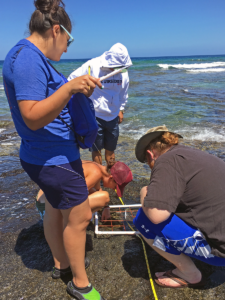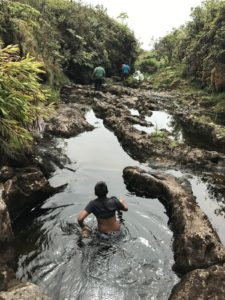Research studies suggest that rural, Hawaiian, and Pacific Islander students are best served and motivated by place-based, project-based, hands-on activities and challenging science instruction, especially when their investigations address real-world problems in culturally relevant terms. By supporting more than 100 teachers in Hawai‘i through professional development, teaching assistance, and logistical support, the Hawai‘i Meaningful Environmental Education for Teachers (HI-MEET) program connects Hawai‘i’s youth to relevant, place-based STEM education opportunities though field research.
Funded through the NOAA Bay Watershed Education and Training (B-WET) Program and Kamehameha Schools, HI-MEET trains and supports teachers to conduct relevant field research activities that are aligned with Common Core and Next Generation Science Standards.
During the 2016–17 school year we worked with a team of master teachers to develop and field test a middle and high school field science curriculum, Huli ʻĀina Kumu Wai (Watershed Investigation), that is aligned with NGSS and Common Core standards.
“We have a huge responsibility to teach our students that resources
are not infinite and we need to preserve traditional practices
while advancing scientific research.”
–Nyra Dee, science teacher, Hilo High School
2017–2018 HI-MEET Program
The yearlong program started with a three-day, hands-on workshop that introduced teachers to the Huli ʻĀina Kumu Wai field science curriculum and included instruction on Hawaiian cultural protocol, kilo observation skills, field sampling techniques, watershed education, and 14 lessons to share with middle and high school students.
»View/download Huli ‘Āina Kumu Wai Field Science Curriculum for Middle and High School
(PDF, 31 MB)
“I really appreciated being a part of this workshop. It was very well organized
and the resources are fantastic. I am looking forward to this school year and
building an exciting science experience for my students.”
– Cristy Athan, science and physical education teacher, Kohala Middle School
- July 25–27, 2017: Workshop in Waimea, Hawai‘i Island, which includes
- The Kohala Center’s Huli ‘Āina Kumu Wai curriculum of field science lessons aligned with NGSS and Common Core;
- field experience to model observation skills, environmental data collection, cultural protocols, and field trip behavior management techniques;
- $200 to purchase field science supplies such as transect tapes, quadrats, ID sheets, magnifiers, and more; and
- ongoing support throughout the 2017–2018 school year to support field science work with students, including transportation, logistics, and classroom presentations.
- Data Analysis Workshop, February 3, 2018 (tentative): Workshop on data collection, analysis and reporting tools.
- HI-MEET Symposium, April 20, 2018 (tentative): Teachers and students participate in a formal scientific conference for the presentation of their research and findings for peer review and discussion. There will be a keynote, inspirational speaker, and a catered lunch.
- Two to Four Classroom Visits
- 1–2 visits: Work with teachers and science experts to present watershed, marine biology, and climate change lessons to students and to prepare them for their field research.
- 1–2 visits: Work with teachers supporting students in their research project development and data analysis.
- One to two Guided Field Trips with students and science experts for field research data collection
PDE3 Credits and Portfolio Requirements
Five (5) credits are available for DOE teachers, Course #AR182295
Questions?
If you have questions, please e-mail igrossman@kohalacenter.org or call 808-887-6411.
“This Program is a unique partnership that allows students to study
and experience Hawaiian ecosystems from a scientific perspective.
Without this partnership, I feel that many of the students
would never see the amazing flora and fauna that once existed on their island.
I hope that by providing this experience, students use their
new knowledge to respect and protect the living things
that surround them and share their experiences with others.”
–Mari Souza, science teacher, Waikoloa Middle School



